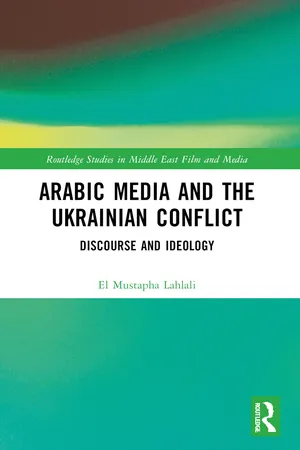
- 144 pages
- English
- ePUB (mobile friendly)
- Available on iOS & Android
About this book
Focused on two renowned Arabic networks, Al-Jazeera and Al-Arabiyya, this book examines Arabic media discourses and strategies adopted in the coverage of the conflict in Ukraine.
Providing an in-depth textual analysis of the coverage of the Russian-Ukrainian conflict, the book focuses on the types of discourse employed, key linguistic devices used, and the representation of different actors, whether directly or indirectly involved. This encompasses the attitudes and perceptions of Russians, Ukrainians, Europeans, Americans, and NATO, as well as the wider international community. The book aims to establish the inextricable link between language and the socio-cultural and political ideologies that contribute to the production of media discourse on conflicts. It is argued that some of these ideologies are represented through language, which itself reflects the networks' policies, the influence of their sponsors, and their individual stances towards the war.
The book will be of interest to students and researchers in a range of fields, including Arabic and Middle Eastern Studies, Media and Communications, and Applied Linguistics, as well as to general readers interested in media's coverage of conflicts.
Frequently asked questions
- Essential is ideal for learners and professionals who enjoy exploring a wide range of subjects. Access the Essential Library with 800,000+ trusted titles and best-sellers across business, personal growth, and the humanities. Includes unlimited reading time and Standard Read Aloud voice.
- Complete: Perfect for advanced learners and researchers needing full, unrestricted access. Unlock 1.4M+ books across hundreds of subjects, including academic and specialized titles. The Complete Plan also includes advanced features like Premium Read Aloud and Research Assistant.
Please note we cannot support devices running on iOS 13 and Android 7 or earlier. Learn more about using the app.
Information
Table of contents
- Cover
- Half Title
- Series
- Title
- Copyright
- Contents
- List of Illustrations
- Acknowledgements
- Introduction
- 1 Introducing Key Approaches to Media Discourse
- 2 Arabic Media and the Framing of the Ukrainian Conflict
- 3 Micro Analysis of Arabic Media Coverage of Conflicts
- 4 Representing Victims of the Conflict
- 5 Covering the War: Framing International Actors
- 6 A Discourse of Invasion or Liberation?
- Conclusion
- Index